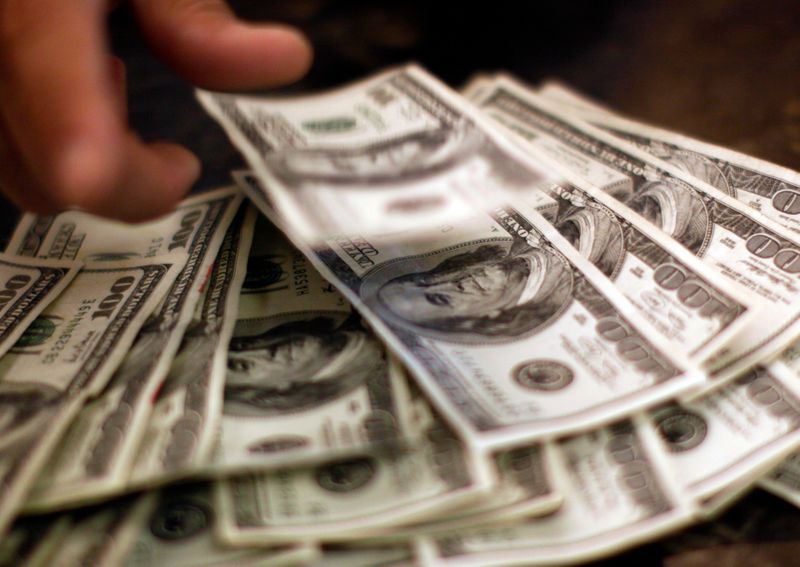By Barani Krishnan
Investing.com -- It was supposed to have helped gold crack the key $1,950 resistance and lift crude to a new weekly high by reassuring us that the U.S. economy was managing just fine with recession.
In the end though, markets seemed to have just one common response to the latest reading of the Federal Reserve’s preferred inflation indicator: “Meh.”
The Personal Consumption Expenditures, or PCE, Index grew 5% in the year to December, versus an annual expansion of 6.8% in June, data reported by the Commerce Department on Friday and compared with historical references showed.
Core PCE, a reading of the index that strips out volatile food and energy prices, was up 4.4% in the 12 months to December versus 4.8% during the year to June.
Both of the headline and core inflation readings for December came in as forecast by Wall Street economists, who largely lauded the Fed’s efforts in curbing inflation with aggressive rate hikes over the past 10 months. But many also pointed out that the central bank had a lot more work to do.
“Under the covers of this report, the Fed might not like seeing services inflation up 0.7% month-on-month,” economist Adam Button said on the ForexLive forum. “That's counteracted by a 1% decline in goods prices, including -2.3% in durable goods.”
Button also reiterated Fed Chair Jerome Powell’s worry about core inflation remaining relatively high — dropping just 0.4% annually over the six-month gap versus the 1.3% slump in headline inflation.
“That's why they [the Fed] plan to hike to 5.00-5.25% and stay there,” Button said, referring to the central bank’s idea of peak rates in order to get inflation back to its long-held target of 2% per annum.
Ed Moya, analyst at online trading platform OANDA, concurred. “Personal incomes rose as expected, while spending obviously took a hit, while the prior positive reading was revised negative,” said Moya. “The consumer is weakening and real personal spending declined more than expected.”
Just a day ago, U.S. GDP for the fourth quarter showed a 2.9% growth, which while being lower than the Q3 reading of 3.2%, was still above the forecast 2.6%. That bolstered the thinking that the Fed’s rate hikes had not weighed too much on growth.
But Friday’s PCE readings unexpectedly raised new concerns about inflation that weighed on most risk assets.
Both the Dow and S&P 500 rose less than half a percent on the day, with tech-heavy Nasdaq leading with a 1% rise.
The Dollar Index also traded in the green, albeit slightly higher. The outlier was bond yields, with the 10-year U.S. Treasury note up almost 1% and for a sixth time in eight sessions.
Gold futures on New York’s COMEX treaded water for most of the day despite a $20 move between its session high of $1,935.10 and low of $1,916.70. The only time the $1,950 resistance was in sight was a day earlier, when COMEX’s benchmark March contract came just shy of the target, at $1,949.70.
“While the much-awaited core PCE Index came in line with consensus, traders reacted by selling gold instead below the key $1,935 level and pushing it down to $1916.88, a tad lower than the previous day's bottom,” observed Sunil Kumar Dixit, chief technical strategist at SKCharting.com.
“Going further into the week ahead, a weekly close below $1,932, especially below $1,929, will increase chances of bears attacking gold again for $1,900 and perhaps $1,875.”
Moya of OANDA also said gold remained vulnerable amid the notion that U.S. inflation was still more than twice the Fed’s target as “supports their dot plots” for higher rates.
“A lot of work remains to get inflation down and that should keep the Fed in a rate hiking mode just a little while longer. Gold is vulnerable to some selling pressure next week as the Fed may refuse to take the BOC’s lead and stick to its inflation fighting manner,” said Moya, comparing the differing stances of the Bank of Canada and the Fed.
U.S. crude fared worse than gold, plunging almost 2% to below the key support of $80 a barrel and was headed for a weekly loss of nearly 3%. There had been widespread expectations that the front-month in West Texas Intermediate crude would cross $85 before the week‘s close. It only got to $82.62.
“To me, the PCE number today was a complete damp squib for oil,” said John Kilduff, partner at New York-based energy hedge Again Capital.
“I think WTI is going to a low of $76 next week despite OPEC+ holding its monthly meeting,” Kilduff said, referring to the oil-producing alliance’s Feb. 1 meeting that is largely expected to roll over production targets from the previous month.
The Fed has added 425 basis points to rates since March via seven increases. Prior to that, rates peaked at just 25 basis points, as the central bank slashed them to nearly zero after the global COVID-19 outbreak in 2020.
While the Fed executed four back-to-back jumbo hikes of 75 basis points from June through November, since December it has imposed a more modest 50-basis point increase. For its next rate decision on February 1, economists expect the central bank to announce an even smaller hike of 25 basis points. The last time the Fed had a 25 basis-point increase was in March 2022, at the start of its current rate hike cycle.
While the PCE is the Fed’s preferred inflation gauge, the broader Consumer Price Index, or CPI, is also used by the central bank to measure the pulse of prices across America.
Inflation as indicated by CPI rose by 6.5% in the 12 months to December, the Labor Department said. It was the slowest annual advance in the CPI since October 2021.
The CPI hit a 40-year high in June when it grew at an annual rate of 9.1%, versus the Fed's inflation target of just 2% per annum.
